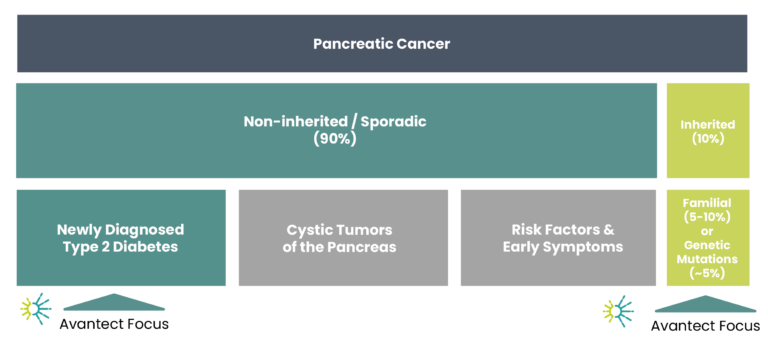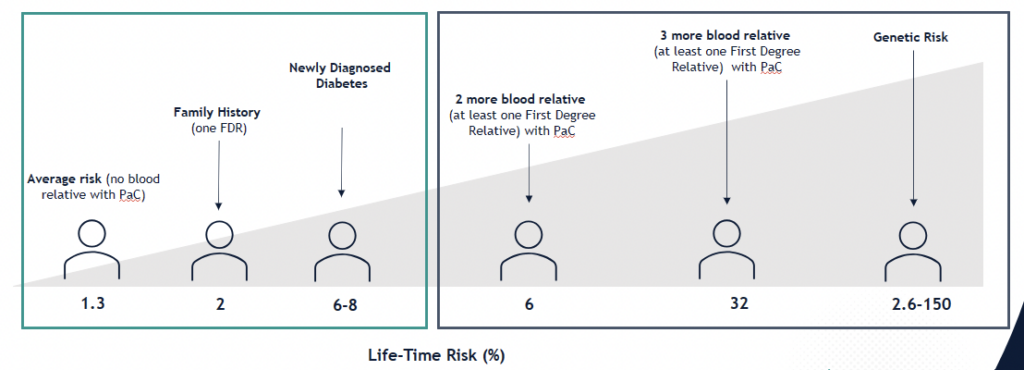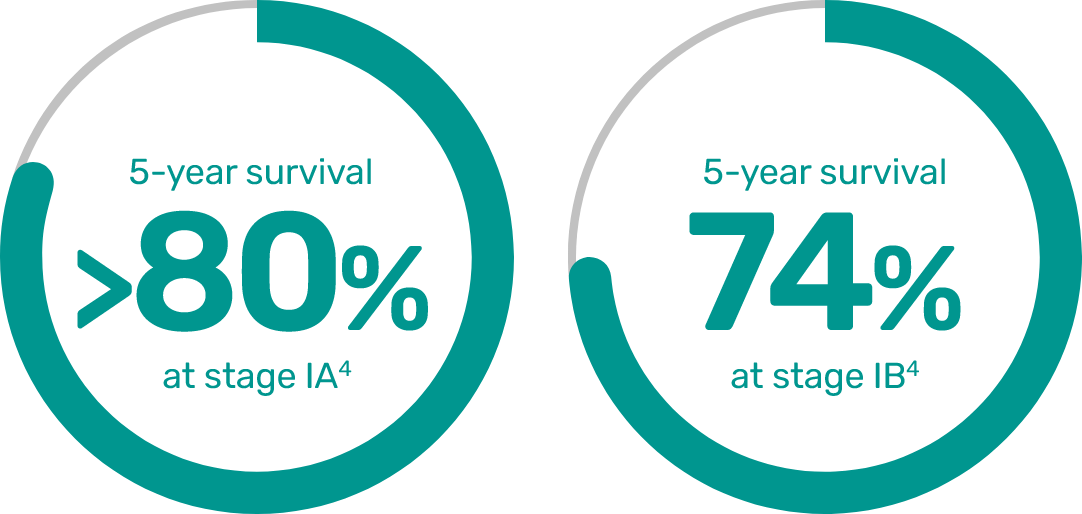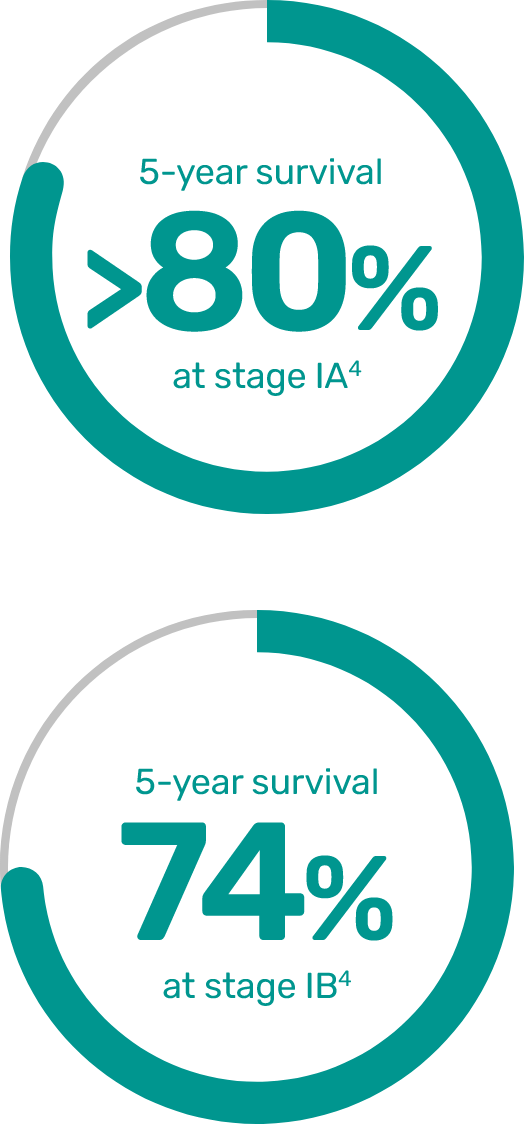Early Detection of Pancreatic Cancer -
Genetic Predisposition & Family History
Early Detection of Pancreatic Cancer
Genetic Predisposition & Family History
Pancreatic cancer is the third leading cause of cancer-related death and is predicted to be the second most common cause by 2030.1,2
~66,440 adults diagnosed in 20223
~51,750 deaths in the US in 20223


Life-time risk was estimated from published Odds Ratio values.
References: 5-8


The potential benefit of early detection of pancreatic cancer patients
The stage of pancreatic cancer at diagnosis has a significant impact on survival.2 Pancreatic cancer diagnosed at its earliest stage (IA) can have a 5-year survival rate of over 80%.4
Identifying patients at high risk for pancreatic cancer
Widespread screening for pancreatic cancer is not feasible due to the lack of effective, affordable diagnostic tests.2,9 Therefore, it is essential to identify patients at high risk who would benefit from testing.2
- Pancreatic cancer becomes more common with increasing age, with over 90% of cases in people over the age of 503,10
- Approximately 90% of pancreatic cancer cases are sporadic, with the remaining 10% having a genetic etiology2
According to guidelines from the American Gastroenterological Association, pancreatic cancer surveillance in high-risk individuals should begin at age 50, or 10 years younger than the initial age of familial onset.11
Prioritizing a significant high-risk population
Genetic predisposition and Family History
- Genetic predisposition and family history can significantly increase an individual’s risk of pancreatic cancer. A family history of pancreatic cancer or known genetic mutations associated with pancreatic cancer (such as BRCA1/BRCA2 or Lynch syndrome) significantly increases the risk of developing this disease.
- Approximately 5-10% of pancreatic cancer cases have a familial pattern12
- Recent advancements in genomics have underscored the importance of genetic factors in assessing pancreatic cancer risk, with certain inherited mutations such as BRCA1/2 or Lynch Syndrome greatly increasing the likelihood of disease5
- Having a first-degree relative with pancreatic cancer can increase your risk by 2 to 3 times12

Individuals with known mutations or significant family history are recommended to undergo enhanced surveillance protocols for early detection by leading professional societies such as the AGA (American Gastroenterological Association) and the NCCN (National Comprehensive Cancer Network).
How the Avantect test changes early pancreatic cancer detection
See how Avantect is changing the way pancreatic cancer is detected.

Important information
The Avantect Pancreatic Cancer Test is an early detection test. The test does not establish a diagnosis of pancreatic cancer, and results should be considered in the context of other clinical criteria. Definitive diagnosis of pancreatic cancer usually requires a series of imaging scans, blood tests, and a biopsy. Not all pancreatic cancers will be detected. Some patients with pancreatic cancer may have a “Signal not detected” result. Some patients without pancreatic cancer may have a “Signal detected” result. False-negative and false-positive results are possible. A “Signal not detected” result does not guarantee that no pancreatic cancer is present. In some cases, no result is obtained. While this is very uncommon, it may be caused by shipping delays or when there is not enough cell-free DNA for the test in the patient’s blood. If this happens, we generally ask for a repeat blood sample for testing at no extra cost.
The test was developed in the ClearNote Health CLIA-certified (CLIA# 05D2249973) and CAP-accredited (CAP# 9219174) laboratory and has not been cleared or approved by the US Food and Drug Administration (FDA).
References and notes
- Bengtsson A, Andersson R, Ansari D. The actual 5-year survivors of pancreatic ductal adenocarcinoma based on real-world data. Sci Rep. 2020;10:1-9.
- Pereira SP, Oldfield L, Ney A, Hart PA, Keane MG, Pandol SJ, Li D, Greenhalf W, Jeon CY, Koay EJ, Almario CV, Halloran C, Lennon AM, Costello E. Early detection of pancreatic cancer. Lancet Gastroenterol Hepatol. 2020 Jul;5(7):698-710.
- National Cancer Institute. Surveillance, Epidemiology, and End Results (SEER) Program. Cancer stat facts: pancreatic cancer (2012-2018 data). Available at: https://seer.cancer.gov/statfacts/html/pancreas.html. Accessed July 22, 2024.
- Blackford A, Canto MI, Klein AP, Hruban RH, Goggins M. Recent trends in the incidence and survival of stage 1A pancreatic cancer: a surveillance, epidemiology, and end results analysis. JNCI J Natl Cancer Inst. 2020;112(11):1162-1169.
- Klein AP. Genetic susceptibility to pancreatic cancer. Mol Carcinog 2012;51:14-24.
- Olson SH, Kurtz RC. Epidemiology of pancreatic cancer and the role of family history. J Surg Oncol 2013;107:1-7.
- Waddell N, Pajic M, Patch AM, et al. Whole genomes redefine the mutational landscape of pancreatic cancer. Nature 2015;518:495-501.
- Biankin AV, Waddell N, Kassahn KS, et al. Pancreatic cancer genomes reveal aberrations in axon guidance pathway genes. Nature 2012;491:399-405.
- Chari ST. Detecting early pancreatic cancer—problems and prospects. Semin Oncol. 2007;34(4):284-294.
- American Cancer Society. Pancreatic cancer risk factors. Available at: https://www.cancer.org/cancer/pancreatic-cancer/causes-risks-prevention. Accessed October 22, 2022.
- American Gastroenterological Association. AGA guidance: when to screen for pancreas cancer. Available at: https://gastro.org/news/aga-guidance-when-to-screen-for-pancreas-cancer/. Accessed November 13, 2022.
- McWilliams RR, Rabe KG, Olswold C, De Andrade M, Petersen GM. Risk of malignancy in first-degree relatives of patients with pancreatic carcinoma. Cancer. 2005 Jul 15;104(2):388-94.)
- Maitra A, Hruban RH. Pancreatic cancer. Annu Rev Pathol. 2008;3:157-88.)
- Petersen GM. Familial Pancreatic Adenocarcinoma. Hematol Oncol Clin North Am. 2015 Aug;29(4):641-53.)
- Lee and Shubham « Personalizing Medicine With Germline and Somatic Sequencing in Advanced Pancreatic Cancer: Current Treatments and Novel Opportunities” ASCO Educational Book Vol. 41 (2021)
- Klein « Pancreatic cancer epidemiology: understanding the role of lifestyle and inherited risk factors” Nat Rev Gastroenterol Hepatol. 2021 July ; 18(7): 493–502
- Shuai et al. “Cancer Risks Associated With BRCA1 and BRCA2 Pathogenic Variants” J. Clin.Oncology 40(14): 1529–1541.